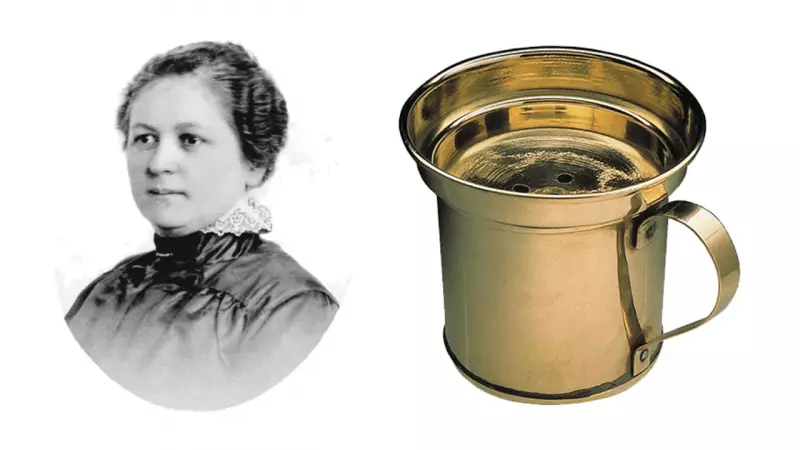
In 1908, a simple act of frustration in a Dresden kitchen sparked a revolution that would transform how billions of people start their day worldwide. Melitta Bentz, a 35-year-old German housewife, forever changed coffee culture with an ingenious solution born from everyday household items.
The Problem With Early 20th Century Coffee
At the dawn of the twentieth century, enjoying a good cup of coffee was nearly impossible. Traditional brewing methods produced bitter, gritty concoctions that more resembled medicine than a pleasant beverage. Coffee grounds were typically boiled directly in water, creating a thick sediment that settled at the bottom of every cup.
Alternative methods offered little improvement. Percolators repeatedly circulated boiling water through grounds, often burning the coffee and stripping away flavor. Cloth filters trapped unpleasant oils and became breeding grounds for bacteria, while metal sieves allowed fine particles to slip through, creating that familiar gritty texture coffee drinkers had reluctantly accepted as normal.
Melitta's Moment of Inspiration
Melitta Bentz refused to accept that bitter, gritty coffee was inevitable. Each morning brought the same disappointment until one fateful day in 1908 when her patience finally snapped. Scanning her kitchen for solutions, her eyes fell upon her son's school notebook and the blotting paper inside - those thin, absorbent sheets designed to soak up excess ink.
In that instant, she recognized the potential. Bentz immediately fetched a small brass pot and punched several holes in its base using a hammer and nail. She cut a circle from the blotting paper, placed it over the holes, added ground coffee, and gently poured hot water over the top.
The result astonished her. What dripped through was a clear, aromatic liquid completely free of the grit that had plagued coffee for generations. The bitterness was gone, replaced by smooth, rounded flavors she had never experienced in her morning cup.
From Kitchen Experiment to Global Enterprise
Recognizing the potential of her discovery, Bentz moved quickly to protect and commercialize her invention. She visited the Imperial Patent Office in Berlin and secured German patent no. 224,960 on June 20, 1908 for her "coffee filtration system employing paper."
Later that year, on December 15, 1908, she established the M. Bentz Coffee Filter Company with just 72 pfennigs (approximately $10 today) and operated from her Dresden apartment. Her entire family joined the enterprise - her husband Hugo managed paperwork and accounts while her sons helped produce filters by hand.
The family worked from their living room, cutting paper, shaping metal cones, and selling their innovative filters door to door. At local markets, Bentz personally demonstrated the device, confidently proclaiming: "No grounds. No bitterness. Perfect coffee." Initial skepticism gradually faded as one taste converted doubters into believers.
Building an Enduring Legacy
By 1910, Melitta's filters were selling throughout Germany. Just two years later, the family moved production to a small factory employing a dozen workers. The company weathered World War I by adapting production and conserving materials, then expanded internationally throughout the 1920s.
Even World War II couldn't extinguish the enterprise. Though the factory was requisitioned for military goods, the family preserved their designs and spirit. When post-war Dresden fell within the Soviet occupation zone, the Bentz family moved west and rebuilt the business from scratch, maintaining the same conical paper filter design that produced clean, consistent coffee.
Melitta Bentz managed her company until retirement, handing control to her sons before her death in 1950. She left behind more than a successful business - she had redefined a universal daily habit.
The Modern Coffee Revolution
Today, the Melitta Group remains a family-owned company headquartered in Germany and operating in over 50 countries. Billions of its filters are used daily worldwide. The fundamental principle Bentz conceived - hot water passing through ground coffee contained in a disposable paper filter - underpins every modern brewing method.
From automatic drip machines to single-serve pods and artisanal pour-overs, every barista carefully circling water over grounds in devices like Chemex or Hario V60 repeats the same motion Bentz performed in her kitchen in 1908. Whether in an office break room, a Tokyo café, or a London household, the lineage traces directly back to that Dresden kitchen.
What makes Bentz's story remarkable is that she had no technical training, business background, or investors. She worked without institutional support at a time when few women ran companies. Her success stemmed from curiosity and refusal to accept mediocrity in life's small rituals.
A Billion Morning Rituals
Today, when approximately three billion people begin their day with filtered coffee, they participate in Melitta Bentz's legacy unknowingly. The clean, balanced flavor free of bitterness and grit flows directly from her experiment with a pot, a nail, and a scrap of her son's homework paper.
She didn't ask permission, seek endorsement, or wait for expertise. She simply wondered "what if?" - and in that quiet question lay a transformation that continues to shape mornings around the world. Every smooth cup of coffee, whether brewed in a machine, French press, or handmade pour-over, carries a trace of that moment when a mother's impatience gave rise to a ritual shared by billions.






